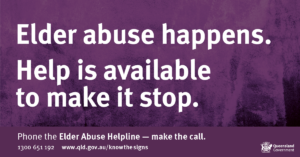
Elder abuse is a real problem in our society. Jubilee Community Care staff do encounter clients in the community at their most vulnerable who are or have been victims of elder abuse.
Elder abuse is a single or repeated act, or lack of appropriate action, occurring within any relationship where there is an expectation of trust which causes harm or distress to an older person. It can be financial, neglect, psychological, sexual, social and/or physical.
One in six older Australians reported experiencing elder abuse in any given year. Age Discrimination Commisioner Dr Kay Patterson AO reports that between January 2021 to June 2021, calls to the National Elder Abuse phone line increased by 87 per cent compared to the previous six months.
Evidence also suggests that most abuse of older people is intra-familial and intergenerational, making it challenging and complex to address.
Many people do not discuss their concerns with others because of feelings of shame, fear of retaliation, the involvement of family members or fear they will be institutionalised. Some people may not realise what they are experiencing is abuse or feel that somehow it is their fault.
All Jubilee staff are responsible for taking action when they suspect elder abuse. Once reported, Jubilee has an obligation to communicate suspected abuse to the Queensland Police Service.
The first priority is safety. If you, or someone you know, feels threatened or unsafe phone 000. If the matter is not an emergency an Elder Abuse Helpline is available for free, anonymous and confidential assistance from 9am–5pm Monday to Friday. Phone 1300 651 192 and an experienced and trained operator will talk to you about your concerns and provide referrals to the relevant support services.
Signs that someone may be experiencing abuse:
The person may be:
** Afraid of someone close to them
** Irritable, shaking, trembling or crying
** Depressed or withdrawn, talking of suicide
** Uninterested in their usual interests
** Presenting as helpless, hopeless or sad
** Worried or anxious for obvious reason
** Reluctant to talk openly.
They may:
** Change their sleeping patterns or eating habits
** Have a rigid posture
** Make contradictory statements not associated with mental confusion
** Wait for another person to answer rather than answer questions themselves
** Radically change their behaviour.
Posted by



